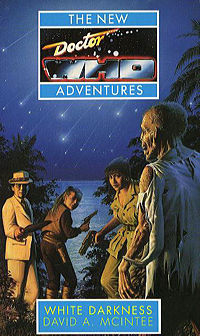
All I’ve been posting lately have been Interactive Fiction Competition reviews, which have a limited audience. So I’m posting this book review I had on hand. Which is about a Doctor Who novel, and therefore also has a limited audience, albeit a completely different limited audience. Sorry.
When, in Kate Orman and Jonathan Blum’s Vampire Science, a villain sneeringly refers to Sam as “Buffy the Vampire Slayer,” it’s hard to remember that in 1997 most people thought of Buffy as a crappy Paul Reubens movie. Vampire Science slipped in at the beginning of a vampire tsunami. Anne Rice started it; Buffy and Laurel K. Hamilton built momentum; today the healthiest marketing category in SF is “paranormal romance,” the genre of hot love between vampires, lycanthropes, and assorted psychics.
Vampires usually represent one (or both) of two things: disease and sex. “Disease” is the older metaphor. For the longest time, how disease got around was a mystery. So a town had some mysterious deaths, and people dug up a corpse for some reason, and it seemed very well preserved. And it looked like the fingernails had grown, and weren’t those canines longer? Â So they staked the thing. Problem solved! This school of vampirism’s most famous representative is Nosferatu’s ratlike Count Orlok.
The other strand of the mythology portrays vampirism as… ah, intimate contact (a phrase which describes both subtext and text). These vampires are hypnotically glamourous. Usually literally. It’s most famously represented by the novel Nosferatu plagiarized: Dracula. Jonathan Harker hardly has time to unpack before he’s surrounded by lovely women with interesting dental work, and I’ve never seen a version of this story in which Lucy and Mina’s trysts with the Count aren’t sexualized.
Over the past couple of decades an army of stories forcibly evolved modern vampires from seductive psychopaths into the heroines’ boyfriends. Sex has won the Vampire Metaphor War. What’s remarkable about Vampire Science, then, is that Orman and Blum found something else to do with their vampires. Continue reading Vampire Science



